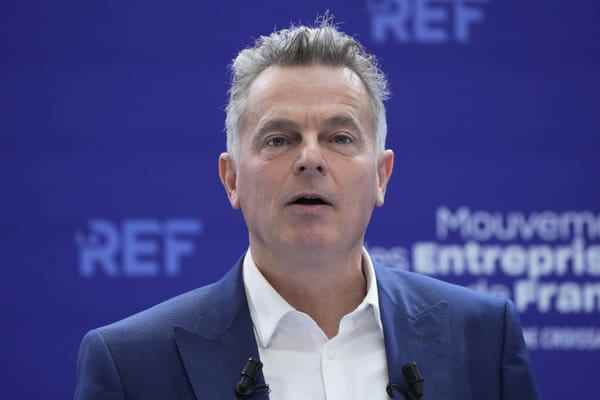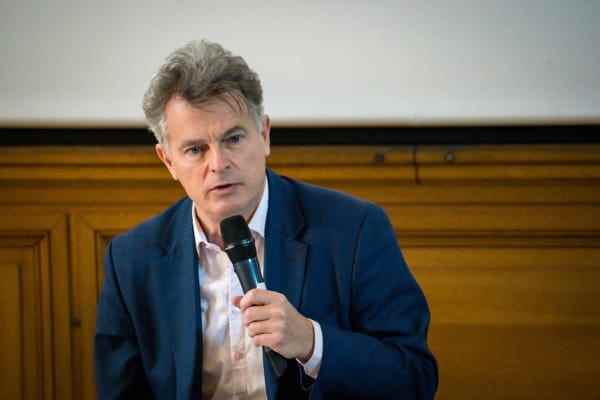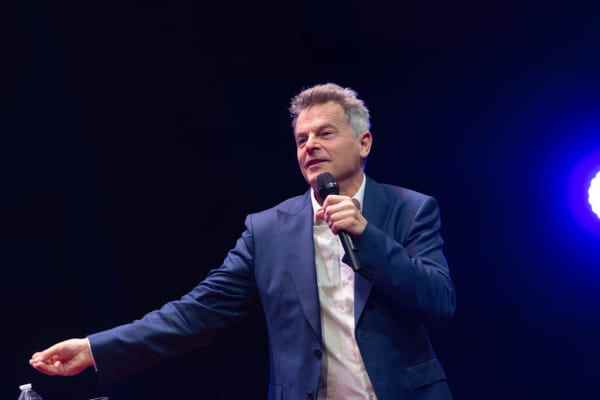Fabien Roussel evokes the abolition of 49-3 before the ESEC
February 23 campaign chronicle. 6:33 p.m. Fabien Roussel was one of the three candidates to present his presidential project before the Economic, Social and Environmental Council this Wednesday, February 23. The main question posed by the organization to the communist candidate concerned the guarantee of democracy, what subject for those who want to embody the “France of happy days”. From the first minutes of his oral, the communist exposed an important measure: the abolition of 49-3, a much-discussed maneuver that allows the government to pass a bill without it being voted on. At the same time, he promotes a project “sincere to build, and to build together […] This is why I am not afraid of the referendum” yet he does not cite any example of measures for which he could consult the French people. Not forgetting that he is addressing the CESE, the pretender of the Communist Party of France at the Elysée indicates that it wants to integrate “the work of the CESE […] in the elaboration of the law” in a systematic way. A novelty for this assembly responsible for making the link between the public authorities and the citizens.
Suspected of fictitious employment, Fabien Roussel refutes the accusations

February 21 campaign chronicle. 4:59 p.m.. Fabien Roussel, who is making a small breakthrough in the polls, has since Monday, February 21, been suspected and sometimes accused of having had a fictitious job as a parliamentary attaché between 2009 and 2014. Mediapat, at the origin of the revelations, explains that the communist was paid 3000 euros monthly by Jean-Jacques Candelier then deputy of the North without any document proving the work carried out by the politician with the parliamentarian. The media specifies that neither of the two men communicated elements making it possible to refute the accusations. Yet this morning on European 1Fabien Roussel maintained the opposite, explaining on the one hand that Jean-Jacques Candelier and his colleagues of the time “will be able to testify, testify to the work that we have done together” and affirming on the other hand: “I have the documents […] I have them, I will show them”, without saying to whom and when. In his defense, the candidate assured that the revelations of the newspaper are not and that the amount of his salary is “an inaccuracy”. At this point, the man provided quantified details: “I have never won €3,000. I started at 2460 euros net in 2009 and I think I ended up at 2700″. Should this be seen as proof of a real job or a strategy to drown the fish?
The newspaper dug in with the main interested parties and when Jean-Jacques Candelier or the communist candidate for the presidential election are questioned about the missions fulfilled by the parliamentary attaché, the answers remain general. “I irrigated his work, his speeches, his questions to the government […] I traveled to the places of struggle, met political activists, trade unions, associations and employees in order to feed the action and the ground anchoring of my deputy”, explains Fabien Roussel, specifying that he exercised his responsibilities in the PCF ” as an activist and volunteer”. As for the collaborators supposed to corroborate the versions of the former deputy and the leader of the PCF, none of those who testify in the Mediapart is unable to describe the missions carried out by Fabien Roussel, one person even claims that the teams “did not see him, we did not work with him” while she details the roles of each employee. One detail, however, serves to defend the communist candidate, one of the testimonies is that of Eric Renaud, former PCF employee in the North and today in “open war” against Fabien Roussel as specified in the article. On European 1the pretender to the Elysée Palace attached himself to this point to discredit the testimonies of the collaborators not going in his direction.
Fabien Roussel wants to embody “the France of happy days”

Campaign column for February 15, 2022. 5:00 p.m.. guest of France Inter this Tuesday, Fabien Roussel developed several points of his program, emphasizing in particular “France on happy days”: claiming to claim “the right to happiness”, the communist candidate castigated an overflow of “punitive reforms since 20 years”. “We asked the French to make considerable efforts. I say basta. I want happy reforms. I want to believe in happiness because it is possible and tell the French that the money is there. It flows freely for some , let’s put it at the service of human development and the planet,” he said. His fight ? “Defend the France which works, the France of good pay, of dignity”. For Fabien Roussel, communism, “is social justice, fiscal justice, the sense of sharing and solidarity, the right to beauty, goodness and cleanliness. It is human dignity and it is the respect for human dignity, especially for all those who work”. The PCF candidate posed as one who wants to embody “a popular, generous and united France”.
Also questioned about the situation in Ukraine, Fabien Roussel was firm: he, president, says he would tell “Vladimir Putin that Ukraine’s entry into NATO is not relevant” . Recognizing that “Putin is not a great democrat” and ensuring that he does not defend his policy, he justified himself: “Diplomacy is not just talking with your friends, it’s talking with everyone And I am for restoring strength to diplomacy, I am not for the diplomacy of force. I would like us to have a real dialogue. [avec le président russe] and let it be said clearly that we, France and Germany, will not vote for Ukraine’s membership of NATO”. On NATO, the communist has a clear position, wishing to see France leave the organization: “How would Chirac and de Villepin have done in 2003, when they refused to embark on the war in Iraq, if we had been, at the time, in the integrated command of NATO? We couldn’t have. I hope, today, that France will be able to find this independent voice and be able to say to the Americans and speak freely to Putin, by clearly saying what is France’s policy in international matters”. What about Europe? Wanting to stand out of the candidate RN Marine Le Pen, he defended the idea of a Europe of Nations: “We have nothing to do with France folded up on its borders and the Frexit. We defend a Europe of nations that cooperate with each other. I want to rebuild a strong France with strong ties with each country and each people”.
Asked about the question of immigration, the PCF candidate insisted that “it is not because of immigration that there are six million unemployed in France” and that France is “as rich and on the strength of its exchanges with other countries”. He recalled wishing for the extension of the right of asylum – “in particular to be able to respond to immigration linked to the climate challenge, as in Bangladesh”. Other societal subjects of its program were discussed, including, pell-mell, the passage from 35 to 32 hours without lowering wages (thanks to a subsidized loan to companies), the creation of 30,000 police positions (who will reinvest the field, he assured), the establishment of a universal speech of autonomy for students, the return of the ISF (as well as its multiplication by three), that of retirement at 60 or further decriminalization of cannabis. The subject of energy was also discussed, with the proposal to restructure EDF (which could lead to its nationalisation) and that of a mix between nuclear energy and renewable energies to achieve a “carbon-free France in 2050”.
